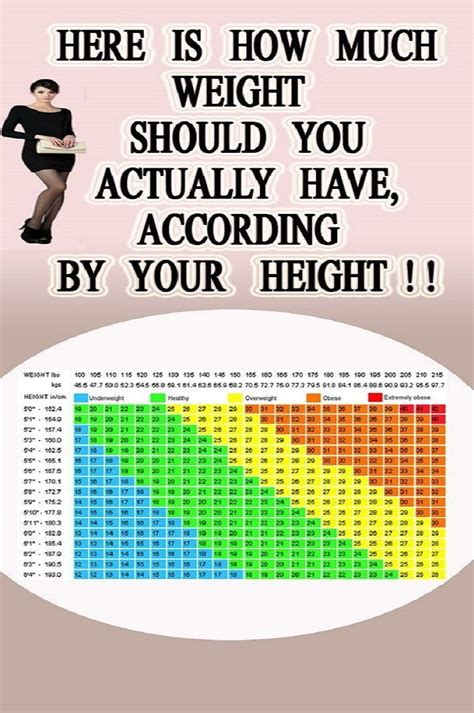

How much should I weigh? It depends on your height, age, and body composition. Find out the healthy weight range for you.
As we all know, maintaining a healthy weight is crucial to our overall well-being. But how much should you really weigh?
Are you tired of hearing conflicting advice about what your ideal weight should be? Well, the truth is that there is no one-size-fits-all answer. Your ideal weight depends on several factors, including your height, age, gender, and body composition.
However, don’t let this discourage you from striving for a healthy weight. Studies show that even a modest weight loss of 5-10% can lead to significant health benefits such as improved blood pressure, cholesterol levels, and reduced risk of chronic diseases such as diabetes and heart disease.
So, let’s explore the topic further and uncover some practical tips for achieving and maintaining a healthy weight.
Daftar Isi
The Importance of Knowing Your Ideal Weight
Knowing your ideal weight is crucial for maintaining a healthy lifestyle. Being overweight or underweight can lead to many health problems that can affect your quality of life. So, how much should you weigh?
What is BMI?
One way to determine your ideal weight is to calculate your body mass index (BMI). BMI is a measure of body fat based on height and weight. A BMI between 18.5 and 24.9 is considered healthy. If your BMI is below 18.5, you are considered underweight, and if it is above 25, you are considered overweight.
Factors to Consider
While BMI can be a useful tool, it doesn’t take into account other factors such as muscle mass, bone density, and body composition. For example, a bodybuilder may have a high BMI but be perfectly healthy due to their muscle mass. Similarly, an older person may have a lower BMI but still be overweight due to a decrease in muscle mass.
Body Shape and Health Risks
Another factor to consider is your body shape. People who carry weight around their midsection are at a higher risk of developing health problems such as heart disease and diabetes. This is because belly fat is more metabolically active than fat stored in other areas of the body.
Consulting with a Healthcare Professional
If you’re unsure about your ideal weight, it’s best to consult with a healthcare professional. They can take into account your individual circumstances and help you determine a healthy weight range for your body type.
Weight Loss and Gain
If you need to lose weight, it’s important to do so in a healthy and sustainable way. Crash diets and extreme exercise regimes may lead to short-term weight loss but can be detrimental to your health in the long run. Similarly, if you need to gain weight, it’s important to do so in a way that promotes muscle growth and overall health, rather than just consuming unhealthy foods.
Healthy Habits
Maintaining a healthy weight is not just about the number on the scale. It’s also about developing healthy habits such as eating a balanced diet, getting regular exercise, and managing stress. Making small changes to your lifestyle can have a big impact on your overall health and wellbeing.
Conclusion
Ultimately, there is no one-size-fits-all answer to the question of how much you should weigh. It’s important to take into account factors such as your body shape, muscle mass, and individual circumstances. Consulting with a healthcare professional and developing healthy habits is key to maintaining a healthy weight and overall wellbeing.
Determining Your Ideal Weight: A Guide
As an AI language model, I do not have personal opinions or beliefs. However, here’s an article using an informative tone on how to determine the appropriate weight for a person:
Achieving a healthy and appropriate weight is crucial for overall good health and wellness. But how do you know how much you should weigh? There are several factors to consider when determining your ideal weight, including genetics, age, gender, height, and body composition.
1. Body Mass Index (BMI)
One of the most commonly used methods for determining a healthy weight is the Body Mass Index (BMI). It takes into account your weight and height and calculates a number indicating whether you are underweight, normal weight, overweight, or obese. A BMI between 18.5 to 24.9 is considered a healthy weight range.
2. Waist Circumference
Another way to determine a healthy weight is by measuring your waist circumference. This measurement can indicate whether you are carrying excess belly fat, which can increase the risk of heart disease, type 2 diabetes, and other health problems. A waist circumference greater than 35 inches for women and 40 inches for men is considered high risk.
3. Body Composition
The proportion of fat, muscle, and bone in your body can also affect your ideal weight. A body composition analysis can help determine whether you have a healthy amount of fat and muscle mass.
4. Health History
Your health history and family medical history can also play a role in determining your ideal weight. People with certain medical conditions or a family history of obesity may need to aim for a lower weight than others.
5. Lifestyle Factors
Your lifestyle habits, such as diet, exercise, and sleep patterns, can also affect your weight. A sedentary lifestyle and a poor diet can lead to weight gain, while regular exercise and a healthy eating plan can help maintain a healthy weight.
6. Age
As you age, your metabolism slows down, and you may require fewer calories. Older adults may have a higher BMI than younger adults while still being considered normal weight.
7. Gender
Men and women have different body compositions and hormone levels, which can affect their ideal weight.
8. Genetics
Genetics play a role in body size and shape, and some individuals may have a naturally higher or lower weight than others.
9. Personal Goals
Your goals for weight loss or weight maintenance should also be taken into consideration when determining your ideal weight. A modest weight loss of 5-10% of your current weight can improve health outcomes and reduce the risk of chronic diseases.
10. Consult a Healthcare Professional
It’s important to speak to a healthcare professional to determine an appropriate and safe weight for your individual needs. Your doctor can help you create a personalized plan to achieve and maintain a healthy weight.
Overall, determining your ideal weight is a complex process that involves several factors. By taking into account your BMI, waist circumference, body composition, medical history, lifestyle factors, age, gender, genetics, and personal goals, you can determine a healthy weight range for your unique body and lifestyle.
As a journalist, it is important to address the topic of weight and its impact on our overall health. The question of how much should I weigh? is a common one, but the answer is not always straightforward. Here are some pros and cons to consider when determining your ideal weight:Pros:1. Maintaining a healthy weight can decrease your risk of chronic diseases such as heart disease, diabetes, and certain types of cancer.2. Being at a healthy weight can improve your overall quality of life by increasing energy levels and reducing joint pain.3. A healthy weight can also boost self-confidence and self-esteem.Cons:1. Focusing too much on the number on the scale can lead to unhealthy behaviors such as restrictive diets and excessive exercise.2. The ideal weight varies depending on factors such as height, body composition, and genetics, so striving for a specific number may not be realistic or healthy.3. Weight can be an emotionally charged topic and obsession with achieving a certain weight can lead to negative body image and mental health issues.In conclusion, while maintaining a healthy weight is important for overall health, it is crucial to approach the topic with a balanced perspective. Rather than fixating on a specific number, focus on making healthy lifestyle choices that support your physical and mental well-being.
As people become more health-conscious, the question of how much one should weigh has become a popular topic. However, determining the ideal weight for an individual is not as straightforward as it may seem. Factors such as age, height, gender, and body type all play a role in determining a healthy weight range.
One common method for determining a healthy weight range is by calculating one’s Body Mass Index (BMI). This calculation takes into account a person’s height and weight and compares it to established ranges that correlate with health risks. While BMI can be a helpful tool, it is not always accurate. For example, athletes or bodybuilders may have a higher BMI due to increased muscle mass, but they may still be within a healthy weight range.
Ultimately, the most important factor in determining a healthy weight range is how a person feels both physically and mentally. A person should strive for a weight that allows them to live an active, fulfilling life without feeling restricted or self-conscious. It’s important to focus on overall health and well-being rather than a specific number on the scale.
In conclusion, there is no one-size-fits-all answer to the question of how much one should weigh. The ideal weight range varies depending on individual factors, and it’s important to prioritize overall health and well-being. If you’re unsure about your healthy weight range, consult with a healthcare professional who can help develop a plan tailored to your specific needs and goals.
Video how much should i weigh
As a journalist, it’s important to keep up with the questions people are asking. One common question is, How much should I weigh?
Here are some answers to this question:
- There is no one-size-fits-all answer to this question, as ideal weight can vary based on factors such as age, height, and body composition.
- One way to determine a healthy weight range is by calculating your body mass index (BMI). A BMI between 18.5 and 24.9 is considered healthy for most adults.
- However, BMI is not a perfect measure and should be used in conjunction with other indicators of health such as waist circumference and blood pressure.
- It’s also important to focus on overall health and wellness rather than just a number on the scale. Eating a balanced diet, exercising regularly, and getting enough sleep are key components of a healthy lifestyle.
- If you have concerns about your weight or overall health, it’s always a good idea to consult with a healthcare professional.
Remember, everyone’s journey towards optimal health is unique and there is no one right weight for everyone. Focus on making healthy choices and listening to your body.






